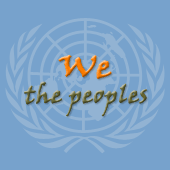Indigenous Peoples Organizations (IPOs) are an important constituency in international climate change negotiations today. Perhaps because as a collective group, indigenous peoples have been dominated and neglected for hundreds of years, often uprooted from their lands and treated disrespectfully. Or maybe on some level, we realize that, as a collective group, indigenous peoples around the world might hold an understanding of the interconnectedness Brett Shollenberger speaks of in his blog.Perhaps we unconsciously feel they might be able share with us some of the natural wisdom we’ve let slip our minds as we’ve aimed to conquer our neighbors in the name of wealth. Or maybe, it’s simply because they represent a minority whose lives will be greatly affected by any climate change related decision, and up until a few years ago, they have not been heard.
As a constituency group, the indigenous peoples organization is coordinated by the International Alliance of Indigenous Tribal Peoples of the Tropical Rainforests.
The objectives of the alliance are to:
-promote full recognition of the rights and territories of indigenous and tribal peoples;
-promote the development of indigenous and tribal peoples and their participation in decision and policy making;
-establish effective networks between indigenous peoples at regional and international levels;
-exchange information and experiences to empower Alliance members to advocate for the rights of indigenous and tribal peoples, enabling them to impact upon processes falling within the complex UN system, and the policies and decision-making of developmental agencies and multi-lateral development banks;
-promote worldwide solidarity between indigenous and tribal peoples.
In November of 2003, representatives of indigenous peoples around the world came together before the COP9 of the UNFCCC and created a joint statement to present to the UNFCC. Together they said:
“There must be full and effective participation of Indigenous Peoples in the UNFCCC by now.”


Discussions around starting a UN Permanent Forum of Indigenous Peoples began in the late 1980’s. The idea was first official suggested at the 1993 World Conference on Human Rights in Vienna, and from what I can find, the Permanent Forum held its first official meeting in 2002. In 2007, the Forum introduced the Declaration on the Rights of Indigenous Peoples noted to be the most comprehensive statement of indigenous rights ever created. The United Nations General Assembly adopted the UN declaration in September 2007.
Although their existence and importance has been formally recognized, indigenous peoples are still fighting for their unequivocal right to participate in the decision-making processes surrounding climate change. Opening new veins communication and finding new forums for discussion surrounding their rights and involvement seem dominant on their agenda, as well as publicizing research on the effects of climate change on specific indigenous cultures and groups.
While a considered a relatively small constituency group, the breadth of the indigenous peoples organization must not be underestimated. The Alliance represents indigenous peoples from over 57 countries around the world and a full array of diverse regions, environments, cultures and values. Still, despite their differences, they stand together and fight for their right to be heard.

Indigenous peoples aim to protect their heritage and their livelihoods by protecting the often-fragile environments within which they live. As a group historically denied their basic rights as human beings, they are asking the rest of us to finally listen. They seem to act not out of anger and resentment at their mistreatment, but out of brotherhood and the severity of the issues at hand. The time has come to release the embarrassments of yesterday, and embrace the collaboration of today.
“Collaboration is really important. The moment that we realize that we are connected to creation, to Earth, the Earth as our cosmic common mother, then by definition you become my brother and not my enemy. Doesn’t matter what color skin you are or where you come from in the world.”
-Gkisedtanamoogk, Wampanoag elder, Teacher, and Indigenous Nation cultural advocate
The question stands… Will we listen?
Tags: coalitions, COP15 Resources, Danielle Hoffman, indigenous peoples, interconnectivity